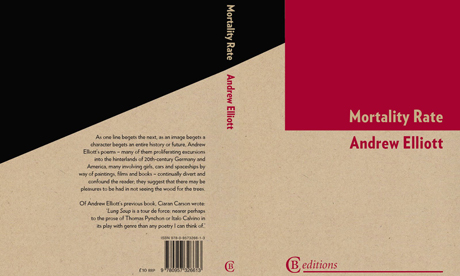Mortality Rate – review

Mortality Rate by Andrew Elliott
Poetry is by definition a form of writing that readers are meant to grapple with. Northern Irish poet Andrew Elliott is known for his collections The Creationists (1989) and Lung Soup (2009), which some have found challenging.
Weird and haunting, his third poetry collection Mortality Rate (2013) is in the same vein as Lung Soup, with Germany, America and decadence at the heart of this collection of more than a hundred pieces.
The poems wander into the wilderness of the Third Reich, 20thcentury America and contemporary Western societies to examine human life from the perspective of communism, capitalism, literature and philosophy.
Andrew Elliott’s writing is fantastically dense, complex and rhythmic. The poems gleefully hop from one image to the other, from one sound to another, thus painting a picture of a peculiar world where the mundane and the surreal collide.
His dark-humoured and nonsensical verse takes the reader by surprise. It offers visions of absurd skits juxtaposing prostitutes and salmon, Polaroid pictures of lovers graphically murdered à la Edward Gorey, and ravings of a madman thinking of himself as Napoleon.
Despite its unsettling and uncanny nature, Elliott’s poetry is remarkably well-crafted. Metaphors recur, poems echo one another whilst working against each other, and each line creates its own poetic jumps and leaps that are unexpectedly put into a coherent narrative thanks to a cryptic language.
Women are a recurrent motif of the collection. Amy, Sabrina and some other nameless female characters travel from poem to poem, but the female body is always objectified. The Peeping Tom of a narrator furtively observes breasts, lips, legs, and recounts gruesome depictions of prostitutes pleasuring clients.
The narrator presents a disquietingly pornographic vision of women as objects offering themselves for his gratification. Male characters are not spared by Elliott’s sadistic treatment either. Shell-shocked soldiers are castrated by the local butcher or men are randomly shot dead while on errands.
Ultimately Mortality Rate is characterised by its ability to point at the most absurd and uninviting aspects of human behaviour. It shows a nightmarish society with few true human connections, a society where one tries to survive by dreaming of escape.
The blurb on the back cover of this edition suggests that “there may be pleasures to be had in not seeing the wood for the trees”. To be sure there is great pleasure to be had in the craftsmanship of Andrew Elliott’s musical verse, but less so in the pervasive sordidness of the message it serves.
